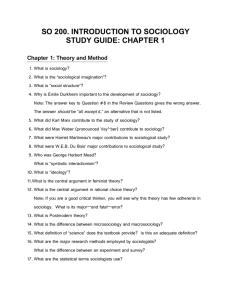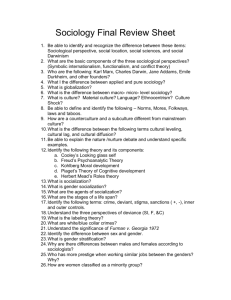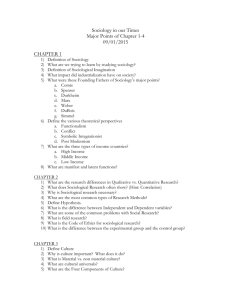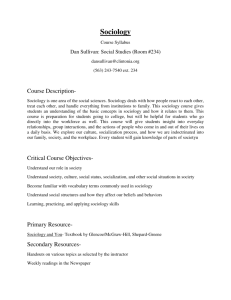SOCIOLOGY 1000-‐001: Introduction to Sociology
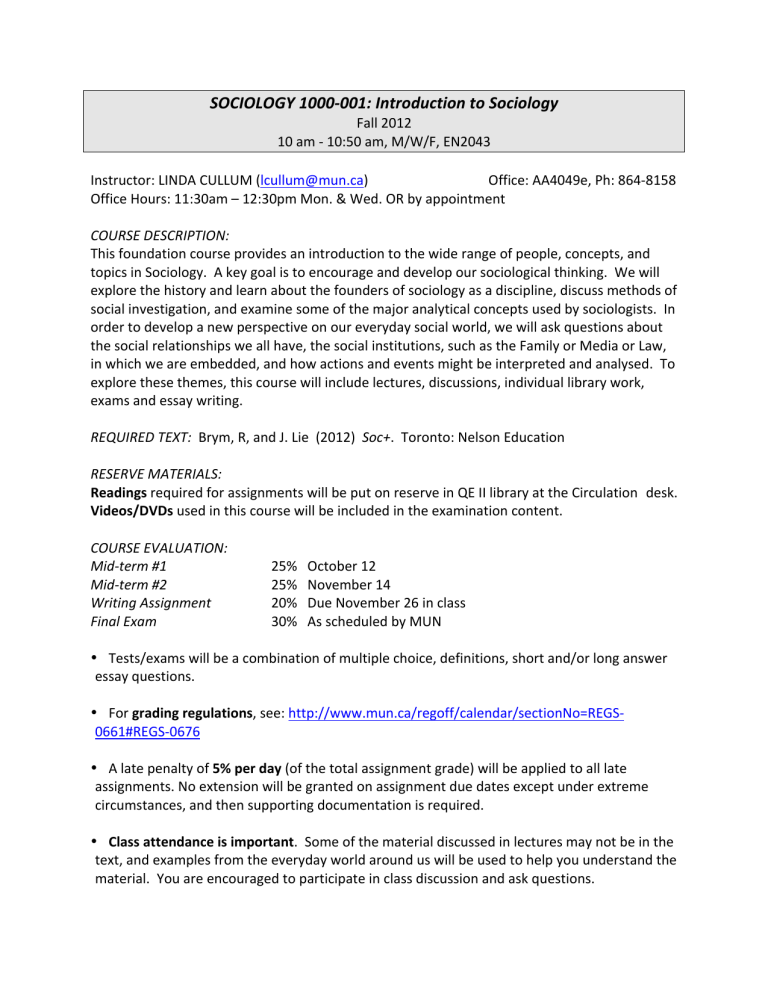
SOCIOLOGY 1000-‐001: Introduction to Sociology
Fall 2012
10 am -‐ 10:50 am, M/W/F, EN2043
Instructor: LINDA CULLUM ( lcullum@mun.ca
) Office: AA4049e, Ph: 864-‐8158
Office Hours: 11:30am – 12:30pm Mon. & Wed. OR by appointment
COURSE DESCRIPTION:
This foundation course provides an introduction to the wide range of people, concepts, and topics in Sociology. A key goal is to encourage and develop our sociological thinking. We will explore the history and learn about the founders of sociology as a discipline, discuss methods of social investigation, and examine some of the major analytical concepts used by sociologists. In order to develop a new perspective on our everyday social world, we will ask questions about the social relationships we all have, the social institutions, such as the Family or Media or Law, in which we are embedded, and how actions and events might be interpreted and analysed. To explore these themes, this course will include lectures, discussions, individual library work,
exams and essay writing.
REQUIRED TEXT: Brym, R, and J. Lie (2012) Soc+ . Toronto: Nelson Education
RESERVE MATERIALS:
Readings required for assignments will be put on reserve in QE II library at the Circulation desk.
Videos/DVDs used in this course will be included in the examination content.
COURSE EVALUATION:
Mid-‐term #1
Mid-‐term #2
Writing Assignment
25% October 12
25% November 14
20% Due November 26 in class
30% As scheduled by MUN
Final Exam
• Tests/exams will be a combination of multiple choice, definitions, short and/or long answer essay questions.
• For grading regulations , see: http://www.mun.ca/regoff/calendar/sectionNo=REGS-‐
0661#REGS-‐0676
•
A late penalty of 5% per day (of the total assignment grade) will be applied to all late assignments. No extension will be granted on assignment due dates except under extreme circumstances, and then supporting documentation is required.
•
Class attendance is important . Some of the material discussed in lectures may not be in the text, and examples from the everyday world around us will be used to help you understand the material. You are encouraged to participate in class discussion and ask questions.
Sociology 1000: Introduction to Sociology Fall 2012
Class Schedule:
Section 1: Sept 5 – Sept 21 Thinking and Doing Sociology
•
Overview Of Course
Course Outline and Evaluation Methods will be reviewed in the first class.
•
The Sociological Perspective (Ch. 1): Learning in the Discipline
What Is Sociology? Or the Sociological Perspective?
Introduction to Social Theory and Theorists
People and Ideas/ Four Theoretical approaches and their application to the real world
•
What Do Sociologists Do?
Sociological Research Methods: What are they? How do we use them?
Context of Social Research/ Theory and Research in Combination/ The Use of Methods/
Ethical Approaches to Research
What questions do we explore as sociologists today?
Section 2: Sept 24 – Oct 10 Social Processes
•
Culture (Ch. 2): Shaping Our Worlds
What Is Culture?
Components of Culture/ Applying Sociological Analysis: Culture as Freedom or
Constraint?/ Canadian & Newfoundland Societies
October 8 & 9: Fall Break -‐ No Classes
***
MID-‐TERM #1: OCTOBER 12 in class
***
Section 3: Oct 15 – Oct 29 Socialization, Interactions & Organizations
• Socialization (Ch. 3): Learning our Culture
Theories and Theorists of Socialization/ Agents of Socialization/ Socialization Through Our Life-‐ course
•
From Social Interaction to Social Organizations (Ch. 4): Our Web of Connections
Theories and Theorists of Social Interaction: Feminist, Conflict , Symbolic Interaction
Networks, Groups, Organizations and Bureaucracies: What are the effects of these structures on our actions, decisions and lives?
Sociology 1000: Introduction to Sociology Fall 2012
Section 4: Oct 31 – Nov 9 Social Stratification and Inequality
•
Patterns of Social Inequality (Ch. 6): Are Some More Equal Than Others?
Systems of Stratification: Wealth, Income and Poverty
Theoretical Approaches to Understanding Social Stratification: Marx, Davis and Moore and Weber
The Consequences of Ranking/ Social Mobility
Global Inequality and Its Results: Some theoretical ideas
November 12: Remembrance Day No Classes
***
MID-‐TERM #2: NOVEMBER 14 in class
***
Section 5: Nov 16 – Nov 23 Inequalities of Race & Ethnicity, Sexuality & Gender
•
Inequalities of Race & Ethnicity, Sexuality & Gender (7 & 8): Structuring Difference
Unequal Access to Society’s Resources:
Race, Ethnicity and Culture: Some Theories/ Canadian Experience: A Multicultural
Country?
Sexuality and Gender: Definitions and Theories/ Impact of Media
Gender Inequality and Feminisms
***
WRITING ASSIGNMENT DUE: NOVEMBER 26
***
Section 6: Nov 26 – Nov 28 Technology, the Environment & Social Movements
•
Environmental Problems and Social Movements
Nov 30
Human Interventions and Movements for Change.
Course Wrap-‐Up
•
Pulling the threads together. Evaluation of course content and methods.
FINAL EXAM DATE AS SET BY MUN: 30%
Sociology 1000: Introduction to Sociology Fall 2012
WRITING ASSIGNMENT
Due: November 26 in class
This assignment calls for a number of responses and should be a minimum of 1200 words in length and written in your own words. Assignments should be typed, double-‐spaced, with a cover sheet containing your response title, your name, student number and date.
READING: Duffy, Ann and Nancy Mandell, “Poverty in Canada.” In R. J. Brym (ed.) Society in
Question: Sociological Readings for the 21st Century.
4 th Edition. Toronto: Nelson, 2004: 138-‐
153. **The book is on Reserve at Circulation Desk in QEII
WORD JOURNAL
The purpose of this exercise is to identify the main theme or the central argument that you see in the reading and concisely summarize your understanding of how this theme is developed throughout the piece. Work for this is to be done individually. I expect to have different
“words” and discussion in all contributions.
TASK: Choose one word (not in the title of the article) that symbolizes the main theme or central argument of the article and explain why you chose this word in 1-‐2 pages of text. While the word provides a focus, your interpretation of how the main points of the article relate to this word is most important. You can also note relationships between the article themes or set
of ideas and the textbook or class discussion.
PERSONAL RESPONSE
In this section of the assignment, you are required to think about your own world, experiences,
and ideas in relation to the ideas found in the assigned article/textbook.
TASK: After completing the Word Journal, put the article in the context of your own life and experiences. Address these questions: How has reading this article affected you? How has it
(re)shaped your thoughts about the experience of different groups in Canada? How might you act on this knowledge? Be specific in each of these areas and give clear examples of actions
you might take.
POPULAR CULTURE
Connect the Word Journal and Personal Response to popular literature sources.
TASK: Locate, copy/print off, and discuss 2 articles from popular literature sources (ie: The
Telegram, MacLean’s, Globe and Mail, Internet site, etc or any other source you read) that address issues you consider central to the article and your thinking. In your discussion of the
items reflect on how they are linked to the academic article and textbook material you have read. Attach a copy of the 2 items to your assignment .



